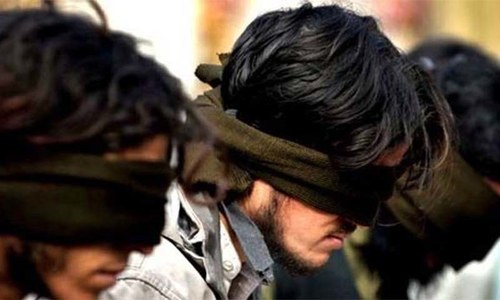KARACHI: For 23-year-old Waqas, the decision to enrol for an international relations degree was preceded by a series of expectations. But to his disappointment, his freshman year at Karachi University (KU) had little to offer in terms of intellectual growth.

“In one of the introductory classes, a professor conveniently told us [students] not to openly talk about three ‘danger’ topics when on campus — Constitution, religion and politics,” Waqas recalls. “Most, actually all of our assignments revolve around the three [danger areas],” he jibes at the irony, sharing how frequent political clashes on campus have deterred critical debate in classrooms as students fear being spotlighted for having an opinion on either of the three subjects.
In the aftermath of frequent conversation on extremism in educational institutions among the political, policy and academic circles, the Higher Education Commission directed universities to take measures preventing radicalisation “opportunities” for students and staff. “The biggest opportunity for radicalising students is the curriculum itself. Choosing not to talk about ‘sensitive’ topics is making the problem worse. Peer criticism is healthy, the youth should know how to receive it and reciprocate,” says Dr Jamil Chitrali, heading the Institute of Peace and Conflict Studies at the University of Peshawar (UoP).
Earlier in 2014, the launch of Nobel laureate Malala Yousafzai’s book I am Malala was banned in the UoP. “No critical discussion can take place over subjects like blasphemy, sex or anything that opposes the popular [religious] sentiment in class,” says Abid Khan, a journalism student at the varsity. Alongside bringing the issue to the forefront, repeated radicalisation discourse bore other [negative] consequences on campus culture as an atmosphere of anxiety developed in educational spaces.
“The administration is apprehensive of students gathered in groups in dread of violent riots — particularly if the students are from ‘restive’ provinces. The teachers are afraid to preach progressive ideas in the presence of religious parties fearing backlash. And the students? They are petrified of becoming the next target of vigilantism,” regrets Ammar Ali Jan, a lecturer at Punjab University (PU).
According to Jan, there exists an unhealthy paranoia that expression of conflict will lead to violence. Following Mashal Khan’s lynching, he tried to pursue initiatives in Lahore’s Government College University to allow the students to express their views on the crucial matter and approach conflict-resolution, but to no avail as the university management found the exercise to be ‘dangerous’.
“After so many reports of students involved in militancy, we have become very insecure. It doesn’t take long for one to suspect someone of being linked with the Taliban for being ‘too Muslim’,” says Mahira, a student of KU.
For long, the authoritative presence of religious parties in universities has influenced student activities. “A religious group in PU organises [religious] events often and forces students out of their hostels and classrooms to attend,” says Sardar Daulat Khan, adding that the group would attempt at enforcing their religious thoughts or agenda through any means, including beating, torturing and harassing the students. Often, teachers too impart and encourage radical knowledge in classrooms. “In a class of MA Literature, a teacher would recite surahs for 45 minutes every day and discourage reading western literature for it was ‘un-Islamic’,” says a KU student.
With radical forces lurking in varsity corridors, unnecessary moral policing overpowers the management’s code of conduct.
“They [religious groups] often roam on the university premises armed with clubs to disperse the male and female students sitting in an open place, even if they were discussing studies only,” says another student, Jaffar Khan, adding that female students are asked to wear a dupatta and dress in “decent’’ attire. “We are asked to report any ‘suspicious’ activity on campus. As of now, there is increasing paranoia, chaos and confusion among the educated — but that doesn’t count,” laments an academician.
Manzoor Ali in Peshawar and Imran Gabol in Lahore contributed to this report
Published in Dawn, October 24th, 2017














































